
Climate is the long-term weather pattern in a region, typically averaged over 30 years. More rigorously, it is the mean and variability of meteorological variables over a time spanning from months to millions of years. Some of the meteorological variables that are commonly measured are temperature, humidity, atmospheric pressure, wind, and precipitation. In a broader sense, climate is the state of the components of the climate system, including the atmosphere, hydrosphere, cryosphere, lithosphere and biosphere and the interactions between them. The climate of a location is affected by its latitude, longitude, terrain, altitude, land use and nearby water bodies and their currents.
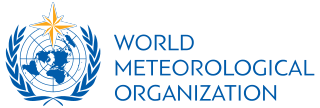
The World Meteorological Organization (WMO) is a specialized agency of the United Nations responsible for promoting international cooperation on atmospheric science, climatology, hydrology and geophysics.
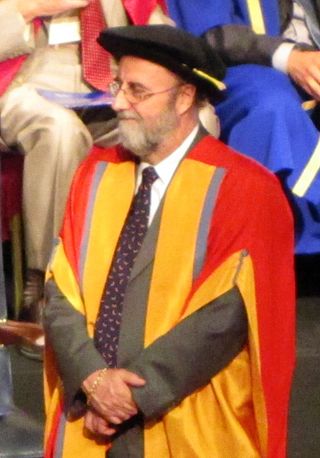
Sir Robert Tony Watson CMG FRS is a British chemist who has worked on atmospheric science issues including ozone depletion, global warming and paleoclimatology since the 1980s. Most recently, he is lead author of the February 2021 U.N. report Making Peace with Nature.
John William Zillman AO is an Australian meteorologist, and former President of the World Meteorological Organization and the Australian Academy of Technological Sciences and Engineering (ATSE). He was born and was educated in Brisbane, Queensland. Through his leadership in professional organizations and advisory groups, Zillman has contributed to shaping science and innovation policy in Australia. More widely, he has contributed to raising awareness to the consequences of global climate change through involvement in the Intergovernmental Panel on Climate Change (IPCC).

Sir John Theodore Houghton was a Welsh atmospheric physicist who was the co-chair of the Intergovernmental Panel on Climate Change's (IPCC) scientific assessment working group which shared the Nobel Peace Prize in 2007 with Al Gore. He was the lead editor of first three IPCC reports. He was professor in atmospheric physics at the University of Oxford, former Director General at the Met Office and founder of the Hadley Centre.
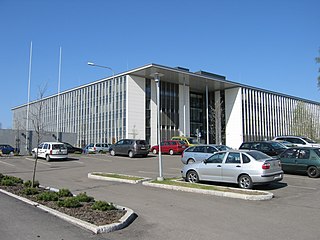
The Finnish Meteorological Institute is the government agency responsible for gathering and reporting weather data and forecasts in Finland. It is a part of the Ministry of Transport and Communications but it operates semi-autonomously.

Joseph Smagorinsky was an American meteorologist and the first director of the National Oceanic and Atmospheric Administration (NOAA)'s Geophysical Fluid Dynamics Laboratory (GFDL).
William Welch Kellogg was an American meteorologist and climatologist. He served as associate director and senior scientist at the National Center for Atmospheric Research (NCAR). His research included pioneering studies of the role that satellites could play in weather observation and prediction.
Aksel C. Wiin-Nielsen was a Danish professor of meteorology at University of Copenhagen, University of Michigan, Director of the European Centre for Medium-Range Weather Forecasts (ECMWF), and Secretary-General of the World Meteorological Organization (WMO).

Jagadish Shukla is an Indian meteorologist and Distinguished University Professor at George Mason University in the United States.

The Croatian Meteorological and Hydrological Service is a public entity for meteorology, hydrology and air quality in Croatia.
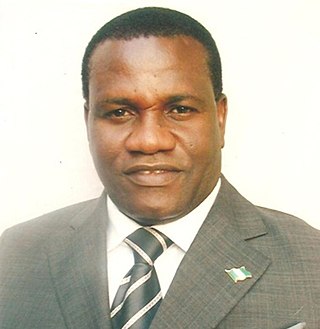
Ernest Asi Afiesimama is a Nigerian environmental and climate scientist who has worked for the Nigerian Meteorological Agency and was a consultant in environmental and climate affairs at Stern Integrated Projects He was also the Coordinator of Save Nigerian Environment Initiative. He currently works with the World Meteorological Organization.
Julie Michelle Arblaster is an Australian scientist. She is a Professor in the School of Earth, Atmosphere and Environment at Monash University. She was a contributing author on reports for which the Intergovernmental Panel on Climate Change (IPCC) was a co-recipient of the 2007 Nobel Peace Prize. Arblaster was a lead author on Chapter 12 of the IPCC Working Group I contribution to the IPCC Fifth Assessment Report in 2013. She has received the 2014 Anton Hales Medal for research in earth sciences from the Australian Academy of Science, and the 2017 Priestley Medal from the Australian Meteorological and Oceanographic Society. She has been ranked as one of the Top Influential Earth Scientists of 2010-2020, based on citations and discussion of her work.

The contributions of women in climate change have received increasing attention in the early 21st century. Feedback from women and the issues faced by women have been described as "imperative" by the United Nations and "critical" by the Population Reference Bureau. A report by the World Health Organization concluded that incorporating gender-based analysis would "provide more effective climate change mitigation and adaptation."
Venkatachalam Ramaswamy is the Director of the Geophysical Fluid Dynamics Laboratory of the National Oceanic and Atmospheric Administration (NOAA) Office of Oceanic and Atmospheric Research (OAR), studying climate modeling and climate change. "A leading climate scientist", his work is cited as supporting evidence for significant stratospheric climate change. He focuses in particular on radiative transfer models and the hydrologic cycle in the atmosphere. He has actively supported the development of supercomputing approaches that enable researchers to achieve higher resolution and greater complexity in climate models. As a lead author involved in the Intergovernmental Panel on Climate Change (IPCC), Ramaswamy's contributions was recognised by the joint award of the 2007 Nobel Peace Prize to the IPCC.
Carolina Susana Vera is an Argentine meteorologist. She is the principal investigator of the Argentine research council National Scientific and Technical Research Council (CONICET), and a professor at the Faculty of Exact and Natural Sciences at the University of Buenos Aires (UBA). Her research focuses on climate variability and global warming in South America.
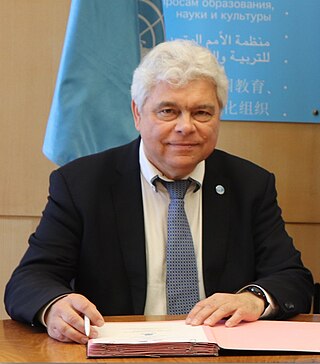
Vladimir Ryabinin, born 23 May 1956 in the city of Korolev in the Moscow Oblast, Russia, is a Russian oceanographer, climatologist, and meteorologist. On 1 March 2015 he became the Executive Secretary of the Intergovernmental Oceanographic Commission (IOC) of UNESCO and Assistant Director General of UNESCO.
Abdulla Ahmed Al Mandous is the current President of WMO. Al Mandous was elected as WMO president for a four-year term from 2023 to 2027 by the representatives of WMO's 193 member states and territories which convened in Geneva for the body's 19th annual congress from 22 May to 2 June, 2023. Al Mandous is also Director General of the National Center of Meteorology (NCM), the government entity that provides meteorological and seismological services and statistical data and information to various entities and the public in the United Arab Emirates to carry out their daily functions.

Godwin Olu Patrick Obasi was a Nigerian meteorologist and the secretary-general of the World Meteorological Organization (WMO) from 1984 to 2003. He was the first secretariat employee to be named secretary-general and the first African to serve as the head of a UN agency.












